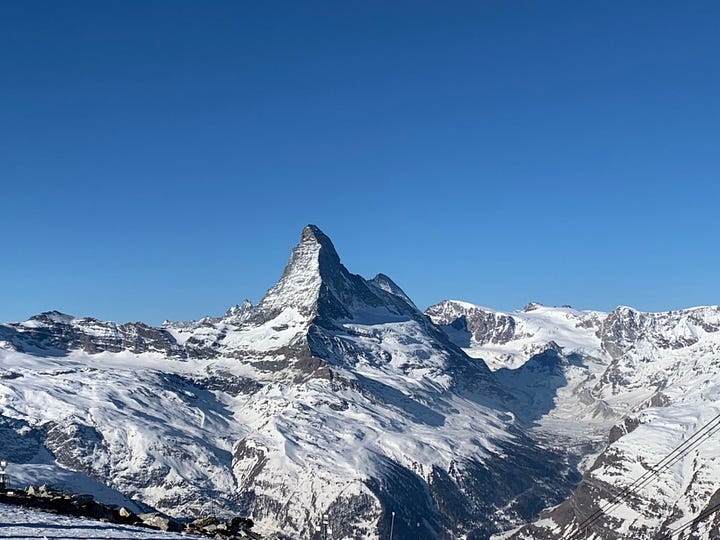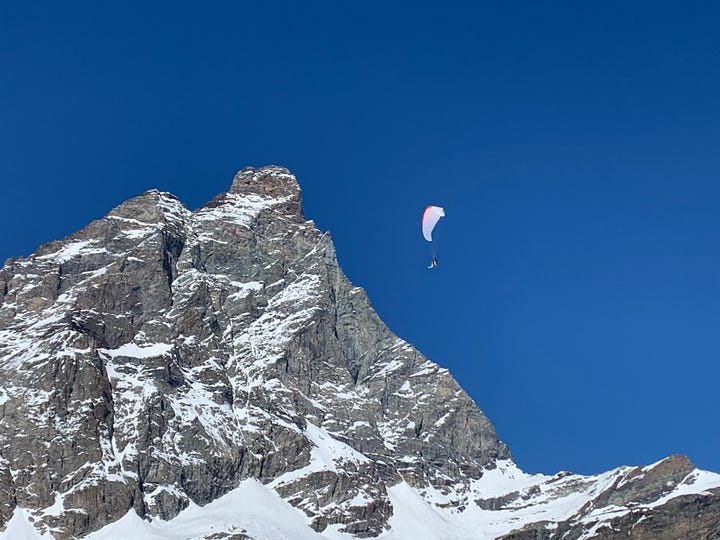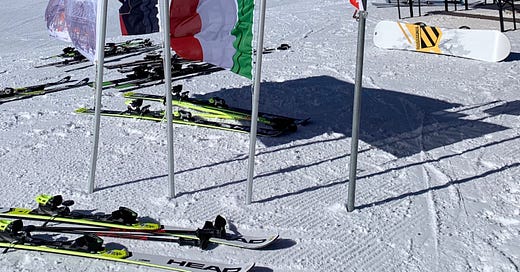Cultural Differences at the (Permeable) Border
On the threshold: what can a ski resort teach us about Ukraine and Russia?
The Saturday Brunch: a figurative flat white or fizzy to start your weekend


Originally drafted a year ago and then published April 5, 2022. One year on from the start of the war in Ukraine, I go back to this moment of reflection that was also the seed for this publication.
I am writing to you from a mountaintop restaurant with Italian and Swiss flags flying under the iconic sun-glistened outline of the Matterhorn, or as the Italians call it: Monte Cervino. Just moments ago, I followed signs with the Italian flag to ski from Zermatt at the highest station in Europe down a fast and sharp ride over an arbitrary peak — one of many — that dropped me into a different country. I continued on; there was no reason to stop. The undulations were new for my legs. Unexpected drops and twists and ice patches greeted me like plates of a chef’s tasting menu or fresh pages of a novel.
Wanting to understand them a little better, I took the chairlift over the relatively short piste. On my lonely little chair, I tootled along, investigating what was below my dangling feet and thinking about what it meant to be on the other side. As soon as ideas of nationhood entered my brain, all the horrific news from breakfast flashed off the glittering ice crystals.
Is this the way a conscripted Russian soldier feels in the forests of Ukraine? What does a Ukrainian refugee think of the snow beneath their feet in Poland?
I had every intention of flying down the same trail again, taking the chair back, and continuing on my way. But something drew me to the little lodge with the flags I had passed. It was within reach; only a few pole pushes were necessary for me to arrive.
Maybe I needed more of a rest because of the horrific images of children dying that swirled in my head. Not to escape, but to be with these thoughts, to grieve even, and try to unload some of their burden, as irrational as it sounds. Money and time and political acts (including art and writing the truth) are what will help, but we also need to reflect on what we see. Reflection helps us grow, and a world of growing individuals will make a better future.
As I went into the little lodge, people greeted me: buon giornio! The Italian spoken amongst the waiters mimics the movement of the mountain tops. My latent Italian came back to me; well, enough to order an espresso. Un caffé per favore? Grazie mille! The coffee is excellent. Much better than the other side. And, it’s a third of the price. I paid in Euros that I keep in a separate compartment from the Francs in my wallet. Because it was 1.50, I gave the waiter 2 and he rang a massive cow bell to thank me for the tip.
Now I sit at the window, drinking a coffee and thinking about the world. Here, I am considering this threshold. The arbitrary spot of border, invented by humans. Too often places of sadness and exclusion. Should we obliterate them? The cosmopolitan open-bordered world seems vacuous, globalised and robotic. Instead, I am thinking about how we can re-signify our borders as spaces of transition and play. How we can use these lines to empower our humanity rather than divide it.
The Border Ellipsis
In Europe, many of us take open borders for granted, or we did before the pandemic. The Schengen Agreement allows us to easily live between spaces or travel without any more than an ID card. It’s not so different from the US where state borders are usually no more tangible than a sign (and a toll to pay on the highway). Any American can tell you there’s a big difference between New Hampshire and Massachusetts or California and Nevada despite their shared permeable borders.
But culture and dialects blur more in the US. In Europe, we may cross an open border and change language and currency immediately. I live on the edge of three nations, in a city that is completely Swiss but also plays with the culture of its neighbours. It has made me acutely aware of the cultural exchanges that go on here, and the culture that is kept intact by the maintenance of a permeable border. In Basel, we are only ever a few kilometres from France or Germany. I have been awed by riding a tram to get cheaper groceries (as well as better bakery products) in France. One stop, people get on speaking mainly Swiss German. The next, a few hundred meters away, the doors open to the completely different tone and cadence of French.
We play in the ellipsis of the border to live freely, the way we want. Jacques Derrida most poignantly analyses this space of play in “Before the Law,” a reading of Franz Kafka’s parable. Physical thresholds and titles to written texts, just like national lines, give us a form of entry into a space where we can bring ideas together in meaningful ways. The sign — Benvenuto in Italia or simply green, white, and red stripes — allows us to take on a different persona as we enter. It tells us we can try out this way of living. This way of seeing the world.
All borders should be this way. We are lucky in the Schengen Area. Other borders are menacing and keep families apart. We have seen it in Mexico/USA and China/Hong Kong, in East/West Germany, in Israel/Palestine…. How many people will die trying to get to another land? How many world leaders will continue to either fortify or, worse, push the extension of the border against the will of people who inhabit those spaces? It’s not only Putin. It’s not only the ‘non-West.’ In America, Trump was spending billions on a wall. Brexit’s insistence on separatism not only keeps many people out but also stagnates the British who are trapped in. How strange for a country that has colonised the most places in the world. Have they not experienced the beauty of other cultures?
But we know it’s not the people, the masses, who want this. Even those who voted for Brexit were often uninformed. In America, most people who want to build an expensive wall wrongly think that Mexicans are taking their jobs. And many Russians who support the current invasion are only seeing fake news. Even with the extreme suppression of free speech and press currently shaping the Russian narrative, only an estimated 58% support the war and more than 13,000 to date have been arrested for protesting.
Straddling the Alps
Back on my little perch on the mountaintop, I look out at the skiers before me. They come from all over, speak many languages, and often wear a piece of their nationhood on their jackets or hats. Often when I ski, I feel gratitude for being one with nature. But unless you are heli-skiing from an unoccupied mountain, you will also see humanity’s marks. You will also experience culture.
Skiing between Zermatt in Switzerland and Cervinia in Italy, sometimes back and forth within minutes, I can see and hear the differences clearly. I’ve lived in both countries, so maybe it makes me more aware of these changes. They are visceral and immediate.
Italy at first appears as a disappointment. In Zermatt, all the lifts are new and high-functioning, usually with leather seats and often a closed gondola to fight the cold temperatures at altitude. A mountain train and flashy cable car (the highest in Europe) round out the speedy system. In Italy, the first lift I take is slow. It’s on orange plastic with no padding. As I look down, the seat next to me has been repaired with a makeshift screw. It stops several times on the way up. Nearby are relatively cheap J-bars and tow-ropes. Eventually I find a gondola with plastic windows so worn that photos are impossible.
And then, I arrive suddenly at a newish fancy cable car to the top. The operator cranks up some club music: ‘Here we f*cking go!’. Helmets and hips are moving all over; nobody seems worried about that swaying they always warn you about. I recall one ride with music on the Swiss side. It was a similar looking large cable car, but with elevator-volume croons from the 1960s.
The trail signs are also different. The Italian ones are tiny and yellow with little information. The Swiss signs are filled with symbols of clarity: numbers and titles, lift designations and directions home.
There’s also less snow on this side. It’s been a warm February. Is it just unlucky? The way the sun hits? Or is it snowmaking capabilities? Or the way the trails were designed? A quick Google tells me yes, Italy is on the sunny side. This has perks, of course, too. And how much of culture is linked with luck of the place a people inhabit? Is it the weather that makes San Diego so relaxed and Boston so grumpy, so resilient?
But you can’t tell too much from the open trails. I liked the feel of lodge, so I come back for lunch, my little Italy. I imagine myself living again in Milano as I did 15 years ago. The polenta and pitcher of wine remind me of trips to Bergamo (now infamous for hideous scenes during the pandemic). I pack my own snacks on the Swiss side. Lunch costs as much as a lift ticket and reservations are a must, at noon or two o’clock. How do I know when I will stop to eat, where I will be? Do I have to stay for two hours to make it worth it rather than hit the slopes when I’m done?
I go to the toilet after I eat and open the door to a squatter. Memories of these toilets in nice restaurants and at monuments flood back to me. Mindfully, I step onto the metal footprints with my ski boots and pray that my stream will miss my pants. The ubiquitous toilets in Switzerland are always clean and white, well stocked with paper. Oh, looks like I’m shaking dry as well, but at least I got to work out my quads a little more.
Do you get what you pay for? Is it all just economics?
The Pandemic and collective trauma
Something else that’s different at this border is the visibility of masks. While Switzerland has declared the end of the(ir) pandemic, Italy is acting more cautiously and still requires FFP2 masks indoors. Just prior to the altitude party in the Italian cable car, uniformed police were checking skiers for vaccine passports and correct face coverings. But it wasn’t only a legal thing; the same party-going operator said permesso to move past me and berate a man hiding in the corner for not wearing his mask.
It’s likely that there is a collective trauma from the pandemic in Northern Italy, where it was the epicentre of the virus in February 2020. These types of communal memories also create culture. Groups of people experience moments together and then respond, hopefully, through art as well as through science and technology. Although the whole world is experiencing the pandemic in some way, our individual and grouped experiences shape who we are.
The Swiss have been luckier. Here, in Zermatt, they show empathy and understanding of their neighbours. The ski area asks you to wear masks on lifts, although not necessarily FFP2. I guess they are trying to make the Italians feel more comfortable. Or maybe living near the Italians has given them some of their trauma or some of their perspective of the world.
The price of a meal or style of toilets are not really a big deal. But what I love about this space some nearly 4000 meters up in the sky, is that the laid back Italians and the punctual Swiss can coexist. That two languages can articulate the beauty of the snow. That we can all enjoy the coffee.
I’m back outside, looking around. People are eating, smoking, skiing. I don’t see helicopters bringing couples to mountain peaks with fondue and roses. I don’t hear large groups of British bankers. Who inhabits this space?
Maybe I need to keep looking.
A mountain by any other name would look as beautiful
I stop looking at people and signs, instead returning to majestic natural beauty. I’ve had a love affair with the Matterhorn this week. I took too many photos, finding different angles of light and positions from which to view it.
The Italians and Swiss have different names for this mountain; they see it from different angles. We’re all sort of the same, but with cultural identity we can be human. We can find joy and meaning in different perspectives and artistic responses to places and experiences.
Culture and turf war is as irrational as the gang fighting of the Montagues and Capulets. This invasion is not really about culture or land; it is about power. Foucault tells us power is everywhere. Its ubiquitous nature also means it is an illusion — to some extent. It is something that can be mined and used by those who persuade others of their power. Who is going to call Putin’s bluff? Who is going to crush this fake power from fake narrative he has created?
If the mountain had no name, it would still exist, but humanity would not. Can’t we all live in this beautiful world and create identities that we can share at their meeting points? Not only at national borders but also at the threshold of one’s apartment or the entry to a classroom?
Be Italian. Be Swiss. Be European. Be Ukrainian. Be Russian. Be a little of each. Go on holiday in Crimea. Visit your relatives in Moscow. Eat each other’s food. Learn each other’s languages. This is what most people want.
The invasion is not about reclaiming a culture as Putin claims; it is about erasing culture. Ukraine, he says, should be ‘freed from the Nazis’, whose fascist head is supposedly President Zelenski, Jewish descendent of Holocaust survivors.
What does it all mean? I am no expert in warfare or economics or politics or Ukraine. But I can tell you that the idea of wiping away a culture is as good as death (and is usually accompanied by death, even genocide). If the idea is to destroy people’s identities, then Putin has failed. Because the idea of being a Ukrainian is now boldly visible. And the idea of being an informed 21st Century Russian (protesters and outspoken expatriates as well as those protesting in the space of their minds only with fear for their children) is just as visible.
Somebody wrote ‘FK PUTIN’ in the snow near the border, big enough for a plane to see. No groomer has erased it for a week despite the supposedly reserved nature of the Swiss.
Switzerland is suddenly no longer neutral, nor is it in NATO. What will Italy do for us if Putin (not Russia) invades? Will they replace their masks with weapons? Or make huge bowls of polenta al gorgonzola and share all their wine? Will they let us ski over this same border to safety?
During the pandemic, we re-closed borders that had been made permeable. We restricted cultural exchange. And we did it all for good reason. But if we have learned anything, it should be that cultural identity is something to celebrate. Borders are places of meaning. And death is something that can hit us all, at any time, with just as much sadness whether we are a poor soldier or a world leader (as opined by Brandy L Schillace).
While we are the ones alive, let us keep looking, both at the many types of people around us and at the natural world in which we are so lucky to inhabit.
Kathleen Waller is a novelist with a PhD in Comparative Literature. Her doctoral dissertation on the Apartment Ellipsis investigates the way immigrants’ domestic borders assert or deny identity based on the host culture and law. For more information: kathleenwaller.com







Beautifully written and crafted piece, Kate. A reflective way to start the weekend - thank you for re-sharing. I can see how your ideas for The Matterhorn came together through this piece.